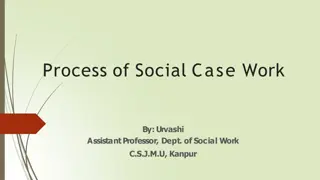Essential Characteristics of a Social Worker
A good social worker should possess qualities such as willingness to listen, empathy, reliability, and respect for confidences to provide effective support. Children's perspectives on what makes a good social worker emphasize the importance of these competencies. Encouraging students to develop questionnaires based on these qualities can help understand the needs and expectations of service users towards social workers.
Download Presentation

Please find below an Image/Link to download the presentation.
The content on the website is provided AS IS for your information and personal use only. It may not be sold, licensed, or shared on other websites without obtaining consent from the author.If you encounter any issues during the download, it is possible that the publisher has removed the file from their server.
You are allowed to download the files provided on this website for personal or commercial use, subject to the condition that they are used lawfully. All files are the property of their respective owners.
The content on the website is provided AS IS for your information and personal use only. It may not be sold, licensed, or shared on other websites without obtaining consent from the author.
E N D
Presentation Transcript
Chandra Sanghavi Kerryn Holborn Hayley Palfreyman SEEKING MEANINGFUL FEEDBACK
WHAT MAKES A GOOD SOCIAL WORKER? A number of different studies have identified the main characteristics of what makes a good social worker, from the child s point of view (Aldgate and Statham, 2001; Morgan, 2006; Curtis,2006; Hill, 1999). Overall, children s comments highlight a range of different competencies and personal qualities that, taken together, provide the necessary foundation for enabling social workers to provide appropriate emotional and practical support in a way that is acceptable to the child. Hill (1999) summarised the key characteristics that children look for in a social worker as follows: willingness to listen and show empathy; reliability (keeping promises, being available, punctuality); taking action (addressing practical problems and material needs); respecting confidences . From Oliver, C (2010) Children s views and experiences of their contact with social workers: A focused review of the evidence Pg 31
EXERCISE Think about how you might encourage a student to develop a questionnaire based on this? willingness to listen and show empathy; reliability (keeping promises, being available, punctuality); taking action (addressing practical problems and material needs); respecting confidences. This is for children but how could you find out what other SUC want from their social worker/social work student and devise the questionnaire based on this?
A POEM BY JULIENNE NICHOLLS (SERVICE USER)
REFERENCES Aldgate, J., and Statham, J. (2001) The Children Act Now: Messages from the research.London: HMSO. Morgan, R. (2006) About Social Workers: A children s view report. Newcastle upon Tyne:Commission for Social Care Inspection. Curtis, D. (2006) Options for Excellence: Improving and developing social care, Children and young people s consultations on their experience of social care. London: National Children s Bureau. Hill, M. (1999) What s the problem? Who can help? The perspectives of children and young people on their well-being and on helping professionals, Journal of Social Work Practice, 13 (2):135- 145



















